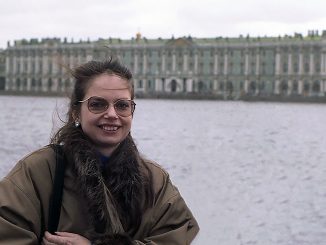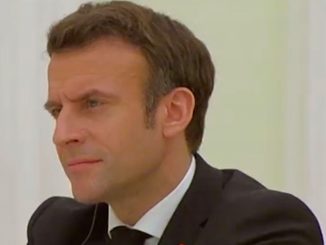“It is in the nature of a despotic government to give rise, even inadvertently, to jealousy among those who surround it: since the will of a single man can change the entire fate of each individual, fear and hope have too much room not to constantly stir up this jealousy, which is moreover very much stimulated by another movement, hatred of foreigners” — Germaine de Staël, De la Russie, in Dix ans d’exil, Paris, Charpentier, 1861.
by Françoise Thom — DeskRussia — 18 mars 2022 —
Many Western observers were surprised by Putin’s attack on Ukraine. Among many of our experts, Putin has indeed long been considered a “pragmatist” busy making money, or defending Russia’s interests. The thesis now in vogue is that Putin, having isolated himself during the Covid, has lost his sense of reality and has become paranoid, hence his unfortunate decision to launch an offensive against Ukraine.
This assessment does not hold water if we examine the past policy of the Russian president, irrational from the very beginning, inspired above all by the desire for revenge and omnipotence. Let’s think about the enormous revenue of the Russian state during the 2000s. What did Putin use it for? To build a huge police apparatus and a military arsenal. Let’s remember that as early as 2001, Dmitri Rogozin, then chairman of the Duma’s Foreign Affairs Committee, said to Lord Robertson: “It is not up to NATO to expand to the East, it is up to Russia to expand to the West.”1 In 2004, at the time of the Orange Revolution, a Kremlin adviser bluntly declared: the Russian president “will not forgive the Western takeover of Ukraine”.2 As early as 2004 Nezavisimaya Gazeta wrote that “Western countries whose energy dependence on Moscow is only increasing will be forced to accept Russia’s growing military, political, and economic influence on the territory of the former USSR”.3
We are also told that the West has refused to grasp the hand outstretched by Putin at the beginning of his reign. In fact, Russia’s attitude was altered not because of alleged Western rebuffs, but because of the evolution of the Kremlin’s perception of the power balance with the West. The deterioration of relations with the West accompanies the rise in oil prices and the booming Russian economy. Putin and his circle have been preparing for war since 2007 at least. In August 2007, a Russian mini-submarine planted a flag on the ocean floor, under the North Pole in order to reinforce Moscow’s disputed claim to the sea floor. Days later, Admiral Vladimir Masorin, the commander of the Russian Navy, announced ambitious plans to expand the country’s main base in the Black Sea, and establish a “permanent presence” in the eastern Mediterranean for the first time since the Cold War. Similarly, Moscow resumed strategic bomber flights in the summer of 2007, reviving a tradition inherited from the Cold War. In his famous Munich speech in 2007, Vladimir Putin had already declared: “Russia has had more than enough of humiliations, of constant attacks on its interests, and, from now on, its interests will prevail.”
The lack of Western reaction after the dismemberment of Georgia in August 2008 greatly emboldened the Kremlin. According to the new Russian military doctrine that was announced in September 2008, “War can break out suddenly and become quite real. Local, latent conflicts, sometimes even called frozen conflicts, can turn into a real military conflagration… A guaranteed system of nuclear deterrence responding to various military and political circumstances must be in place by 2020”. On September 30, 2008, following the Russian-Georgian war, President Medvedev developed themes that have since become familiar to us: “Today Russia asserts itself ever more defiantly in economic, political and military spheres. Many people are not happy about this. Some forces in the world would like to see us weak. Some forces will not forgive us [the intervention in Georgia], but we do not care… Russia must be strong and great, or it will cease to be. Russia is too tempting for others who look enviously at our territory, at our natural wealth, at our possibilities. The world has not become simpler, but a new force has emerged that is capable of maintaining order in the world. This is the main lesson of the war in the Caucasus.”
As seen above, 2020 was the date planned by the Kremlin to launch the showdown with the West. The Covid pandemic forced Moscow to postpone the execution of these plans. In 2021, however, Putin felt that the balance of power had shifted sufficiently in Russia’s favour, that he was now in a position to successfully blackmail the West. He has, as such, undertaken to “carve out a place for himself in the new world order through creative destruction,” as Sergei Karaganov puts it. The American debacle in Afghanistan and the completion of the Nordstream2 have left him with the belief that the United States is weak and ready to retreat throughout the world, while, at the same time, the Europeans would be controlled by their dependence on Russian gas. He imagined Gazprom closing its taps and the gas shortage bringing the Europeans to their knees, while America would be paralyzed by its confrontation with China. For him, the Western world is therefore ripe for a radical redistribution of power in Europe, that would give Russia a hegemonic position on the continent. These premises are at the origin of the ultimatum of December 17, 2021, demanding a retreat by NATO to its 1997 positions, unless Russia would take military action. Thus Putin has put his foot in a vicious circle that may end up crushing him.

Emboldened by precedent, the Russian president was certain that the West would yield to blackmail. Putin’s miscalculation comes from his misunderstanding on how democratic countries work. He imagines them subject to a Russian-style “vertical of power”. He sees weak leaders in front of him, and he likes to think of himself as a providential strong man. Therefore, in his mind, all the advantage goes to Russia; it has a leader, a will, a unity of action. He has become accustomed to winning in all the coups de force he has allowed himself so far.
Dr Françoise Thom wrote in 2019 « Comprendre le Poutinisme : Pour sortir du mensonge » Understanding Putinism: Getting out of the lie (Desclées de Brouwer)
He imagines that the West will comply with its usual plaintive protests, and symbolic gestures and that business will shortly resume. He does not understand, democratic countries are bound principally by their institutions, not by leadership, having broad means at their disposal; he does not take into account the strength of public opinion, unless he has formed an exaggerated idea of the Kremlin’s ability to manipulate it. He was certainly surprised that his ultimatum was not accepted.
In response, Putin launched his “special operation” in Ukraine with the idea that Ukraine would be easy to break up, that the West, long tired of Ukraine, would hardly react. All Westerners, he thought, would see how powerful Russia is and would submit.
How and why did Putin make such a mistake? How can we explain his miscalculations4? We will see how he fell victim to the very mechanisms of the system he set up, exactly like other autocrats on the Russian throne before him, and for the same reasons. Let’s look at the Russian president’s main mistakes.
1) A wrong assessment of the military-political situation in Ukraine. The origin of this misjudgment was formulated by the historian Nikolai Vlasov: “One of the fundamental problems of Russian foreign policy thinking — both at the level of the average citizen and, I fear, at the level of experts — is an arrogant and condescending attitude towards all states that are significantly smaller and weaker. […] We do not recognize their right to have their own will, their own interests, by telling them that international relations are for the big guys, and that you, the dwarf, have nothing to do with them because you do not understand them. Two deplorable consequences follow from this. First, the quality of analysis and understanding of the current event on the international stage is calamitous. The idea that a small state (and not just a small state, but a state with minimal armed forces, such as West Germany) cannot do anything itself, by definition, and is only a puppet in the hands of others, leading to the formation of a completely inadequate picture of the world, systematically steering to erroneous predictions and misguided actions.”
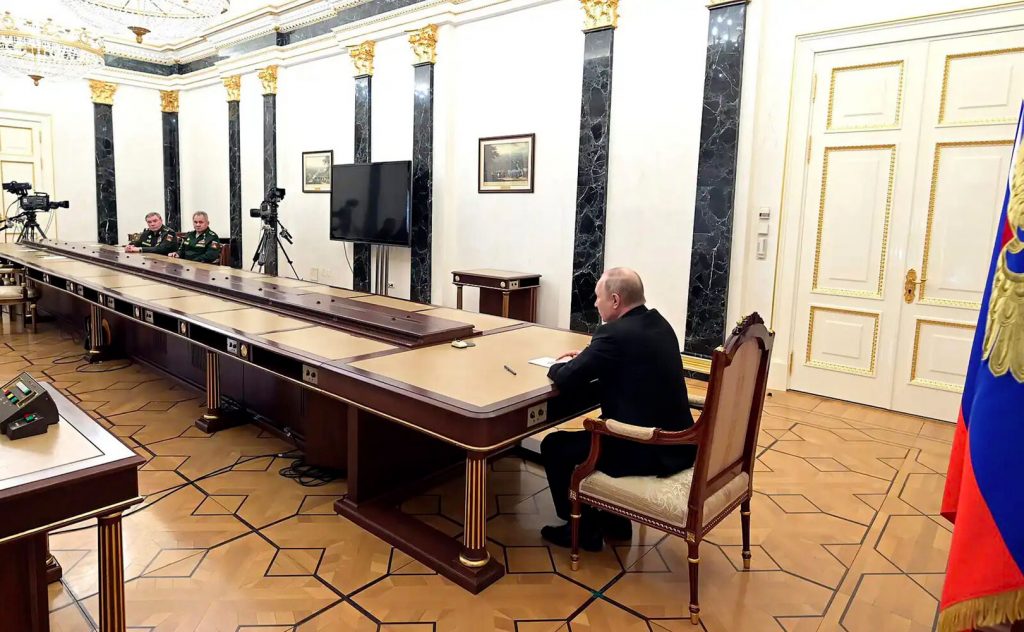
Putin got caught up in his own mythology, and came to believe that the Ukrainian people were oppressed by a handful of “Nazis” in Kiev and would rise up at the time of the Russian invasion, burning to return to the motherland. He was convinced that Ukrainians were not a nation and that Ukraine was a failed state. The notes transmitted by his services only confirmed him in his convictions. Thus a source inside the FSB wrote to Vladimir Osechkin, the founder of the Gulagu.net website: ”(bogus) reports claimed that there were at least 2,000 trained civilian fighters in each major city, who were ready to overthrow Zelensky. And that at least 5,000 civilians were ready to demonstrate with flags against Zelensky and even for Russia, at the first call. And hold on to your hat. It was anticipated that we would have to play the role of referee between competing Ukrainian politicians who would argue among themselves about who would be invested with the status of ‘friend of Russia’. We had even defined the criteria for choosing the best of the best.”
Putin had hoped that the political regime in Kiev would collapse like a house of cards when Russian troops entered. In reality, it was the pro-Russian party that evaporated as soon as the Russian offensive began. Confident Ukraine was an artifact made by Russia’s enemies, the Russian president failed to see that Ukraine had created a real state under Poroshenko and Zelensky. He was mistaken about Zelensky, thinking he was a clown and a pushover. In his view Ukraine was like the separatist republics of Donetsk and Lugansk; they have become a counter model for the entire Ukraine, including Russian-speaking Ukraine. He did not foresee that the Russian invasion, far from splitting Ukraine between the eastern and southern regions and the rest of the country, has welded the Ukrainian state together, and has removed the gap, that once existed between the predominantly Russian-speaking regions of the east, and the western part of the country.
2) A misjudgment of the military potential of the Ukrainian army. The memory of the annexation of Crimea in 2014 and the rout of Ukrainian forces at the time played a bad trick on Putin and the Russian General Staff. At the time, the Ukrainian special services and army had been fully penetrated by Russian agents. In 2022, the resistance of the Ukrainian army came as a complete surprise. On March 5, the Russian media began to acknowledge the failure of the first phase of their “special operation”. Sergei Kozlov, a veteran of the Spetznaz, acknowledged: “The situation in Ukraine, frankly, is far from simple, and the active military phase is still far from over. However, one way or another, things will turn out in Russia’s favor. Contrary to a widely held belief that the Russian army would be greeted in Ukraine with flowers, this has not been the case.”
3) A misjudgment of the Russian army’s combat capability. Putin again believed his own propaganda, the reports sent to him by his staff, praising the unparalleled power of the Russian army. He is not the first Russian autocrat to have been deceived by obsequious subordinates competing with each other for the master’s favors. One thinks of Nicholas I in 1854, at the time of the Crimean War. On the eve of the battle of Alma, which took place on September 20, 1854, Prince Menchikov, commander of the Russian forces, was so sure of victory, that he invited the inhabitants of Sevastopol to watch the battle from the surrounding heights!
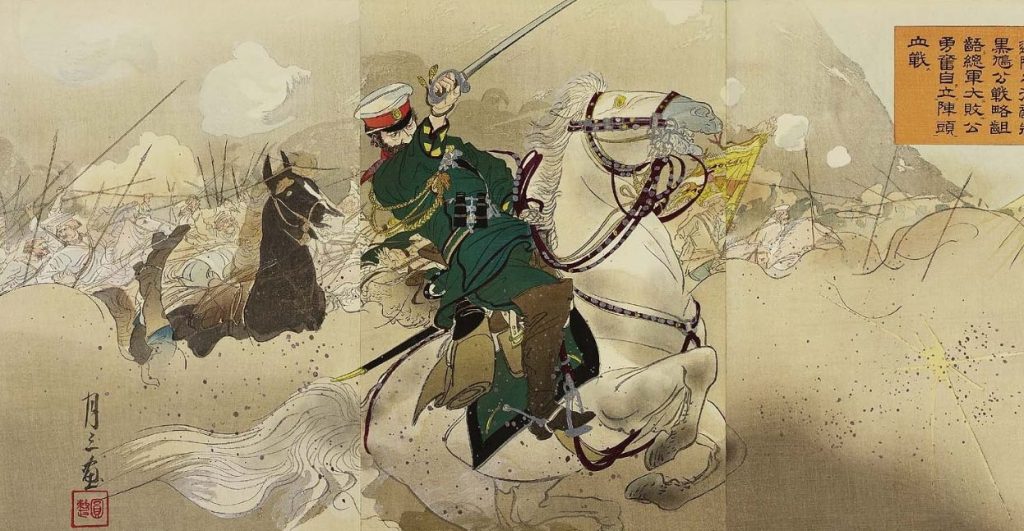
How can we not mention also the thoughtlessness Nicholas II demonstrated in the confrontation with Japan in 1904, convinced that the Russian army would make mincemeat of the Japanese “monkeys”, as they were called with contempt in the imperial court. Nicholas II was certain that “…Japan, perhaps with some effort, will be beaten to the core. As for financial resources, we have nothing to fear, since Japan will have to pay reparations.”
Comment ne pas évoquer aussi la légèreté avec laquelle Nicolas II s’est engagé dans l’affrontement avec le Japon en 1904, persuadé que l’armée russe ne ferait qu’une bouchée des « macaques » japonais, comme on les appelait avec mépris dans la cour impériale. Nicolas II se disait certain que « … le Japon, peut-être au prix d’un certain effort, sera battu à plate couture. Quant aux moyens financiers, nous n’avons rien à craindre, puisque le Japon aura à verser des réparations. »
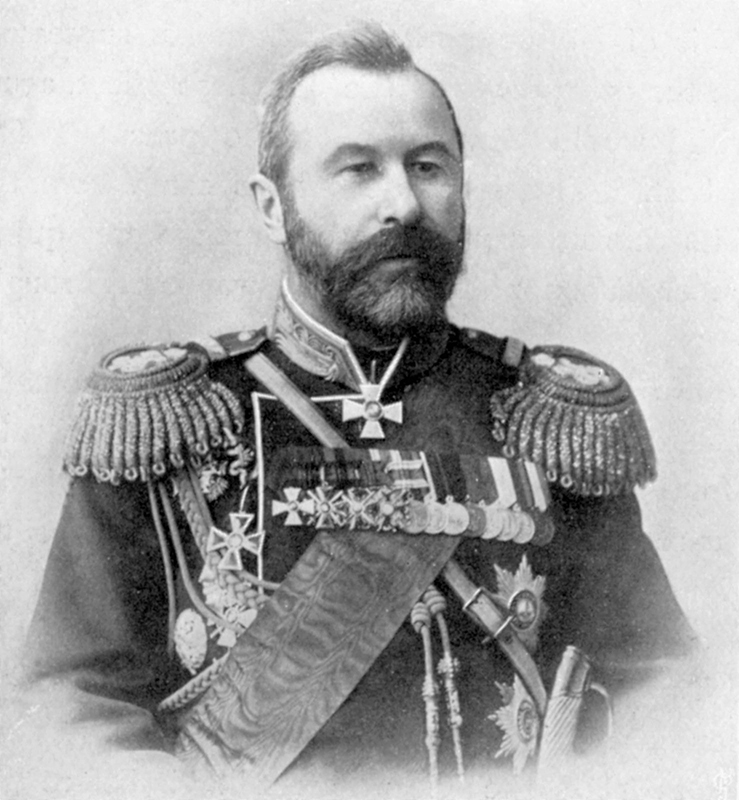
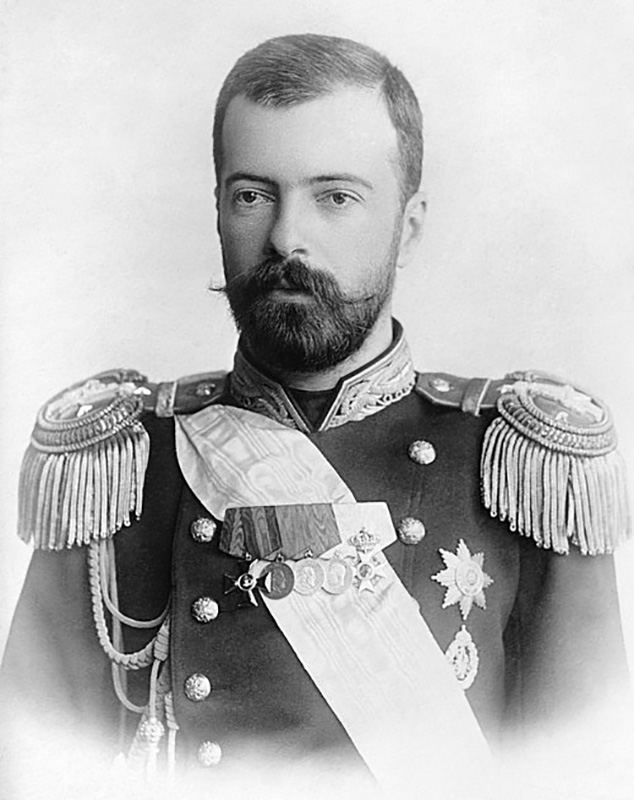
It turns out, the Russian army faced a huge problem of logistics. Kuropatkin, the Minister of War, wrote in a letter to Nicholas II dated October 30, 1904: “Our equipment sent from European Russia has been blocked on the Siberian railroad since the Spring. The waterproof capes sent for the Summer will arrive when furred jackets are needed. I fear that we will not get pelisses for the whole army until we need waterproof capes”. In the winter of 1904-1905 alone, 700 wagons carrying clothing were lost.
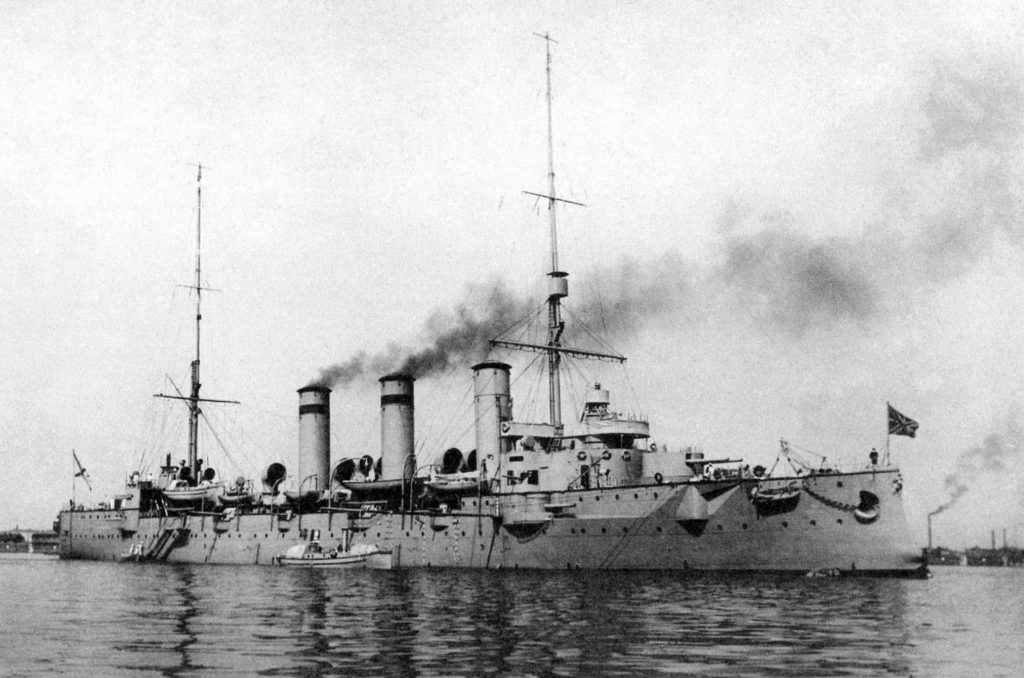
The Russian fleet had been considered the third largest in the world (after England and France). It was headed by Grand Duke Alexei Alexandrovich Romanov, the uncle of Tsar Nicholas II, who was also in charge of the Ministry of the Navy. He was not a frequent visitor to the Admiralty or to the Council of State. He preferred to spend his time in European seaside resorts, gambling and squandering the public funds he had embezzled. It was said that he spent the equivalent of a cuirassier on Parisian belles every year; his mistress’s diamond necklace was nicknamed “the Pacific fleet”. The armored lining of the Russian cuirassiers of this period came off in patches, because it was attached to the frame not with metal rivets that had been stolen, but with wooden rings, and sometimes even with tallow candles.
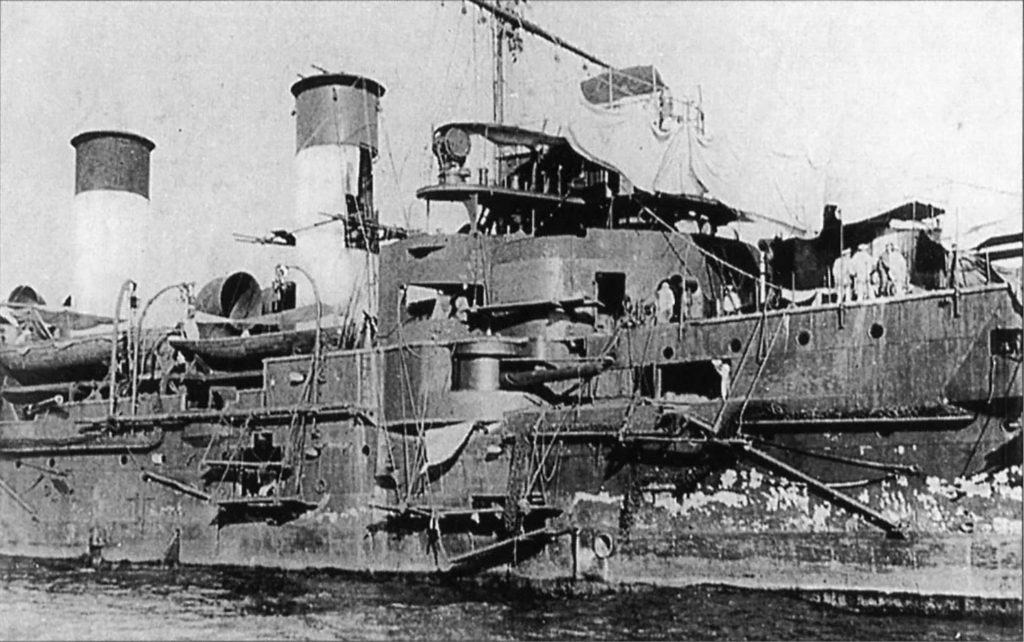
In addition to these defective battleships, the department entrusted to Admiral Romanov produced shells that did not explode and cannons that exploded and killed Russian artillerymen. In 1903, the grand duke bought a luxurious estate in France, and as luck would have it, 30 million rubles disappeared from the Navy’s budget — exactly half of the fleet’s annual funding. No investigation into bribery and corruption in the Ministry of the Navy ever implicated the Tsar’s uncle. After the Tsushima debacle he was finally forced to resign and received the nickname “Prince Tsushima, who stole more than the Japanese ever sent to the bottom”.
The Soviet period was not left behind. Stalin was convinced in November 1939 that the local forces of the Leningrad military district would be enough to defeat Finland in a few days (he too was thinking of a “special operation” and had already prepared a communist government that he planned to install in Helsinki). In March 1940, furious at having been misled, he dismissed the head of military intelligence.
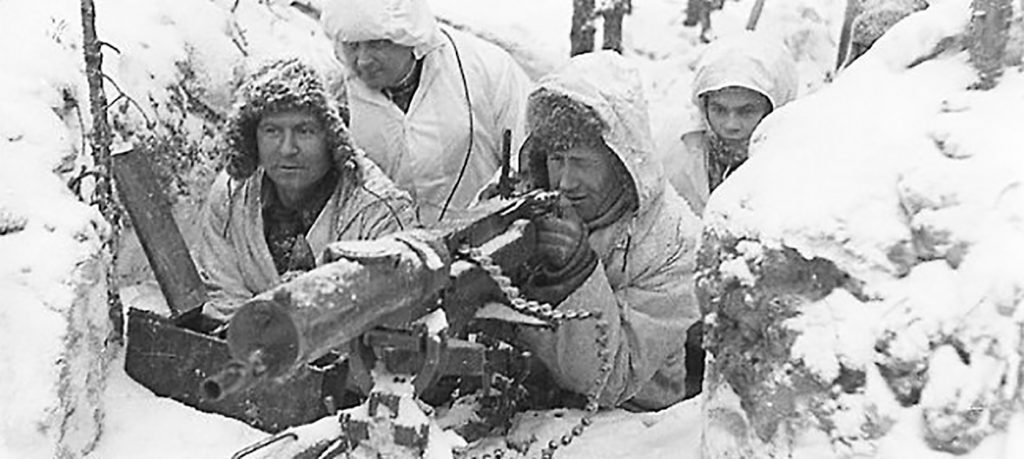
Finally, let’s recall that after the “limited contingent” was sent to Afghanistan on December 25, 1979, Pravda announced that it would remain there only two weeks; it was expected that Soviet troops would be stationed in garrisons responsible for the protection of industries and strategic sites, freeing the Afghan army to concentrate on the fight against opposition groups, as well as against possible external interference.
Like his predecessors, Putin imagined the glowing reports submitted to him by his subordinates would reflect the real combat capacity of the Russian army. However, the “special operation” in Ukraine demonstrated, at the end of the third day, the Russian army does not differ, as much as it was thought, from the army of the Second World War, relying on tanks and cannon fodder. Precision weapons are rare or not as accurate as the generals report. The army has relied on numbers not strategic skill. The logistical deployment has been calamitous, the shortage of weapons and supplies was noticeable from day three. In occupied regions, the soldiers looted everything — food, sanitary facilities, crockery, linen — exactly as the Red Army did in Europe in 1944-46. The failure of the Blitzkrieg has prevented Putin from presenting the international community with a fait accompli; the courage of the Ukrainians has awakened Europe.
4) An underestimation of the strength and solidarity of the international reaction. In December 2021, RIA Novosti wrote: “The Atlanticists, despite all their appetites, will not enter into open conflict with Russia, they do not want it and are afraid of it. Even reasonable Anglo-Saxon strategists understand that the West does not have the strength to keep Ukraine in its orbit for a long time, the laws of Russian history (like the laws of geopolitics) will always work.” Putin has convinced himself through long experience of the West’s cowardice. He brags he is controlling a large part of Western elites: did he not boast to a European foreign minister that Russia could buy anyone in the United States and Europe? He can not imagine things can change. The Kremlin has exaggerated its hold on Germany, as much as Nicholas I, when he was under the illusion Austria would support him in 1854. Putin has been stunned by the scale of the sanctions and the endless list of countries that has joined them. He had not taken into account that a war in the heart of Europe would provoke a much stronger reaction than he had anticipated. Moreover it became clear his goal was to destroy the post-Cold War European order.
5) An overestimation of the effectiveness of nuclear blackmail. For years Putin has believed that with his nuclear shield and his doomsday missiles, he could afford to do anything. For a long time it has been the case. But the aggression against Ukraine has changed everything, showing the limits of nuclear blackmail, to the extend of counter-productivity: those very threats persuaded the West to wage an all-out economic war against Russia.
6) The overestimation of the success of the import replacement policy implemented since 2014. Reading a study published on November 21, 2021 by the very official think tank Russtrat, we can understand why Putin responded as he did: “The current historical situation in Russia is unique. The state has prepared itself for major challenges that may arise under critical pressure. Huge reserves have been accumulated, including gold. National financial and information infrastructure plans have been created and launched. Digitization has begun to encompass the entire economy, bringing it to a new level of competitiveness. The expansion of our own industrial base, including in highly sensitive high-tech areas, is proceeding in leaps and bounds, the ‘technology gap’ is closing. We have overcome critical dependence in the area of food security. […] For the past five years, the army has been the world’s leader. In this field, the ‘technology gap’ is in our favor and is only widening… Moreover, the explosion of planetary inflation is causing an energy crisis, making the Europeans, for the most part, much more accommodating, and rules out a blockade of our energy supplies, WHATEVER WE DO. […]”
Again, Putin did not realize his officials were boasting. He took the bragging of his ministers at face value. But a few days after Western sanctions were introduced, it was already clear that import substitution was a fiction. Vladimir Putin had been convinced, he had made Russia an impregnable financial fortress. The freezing of the Central Bank’s assets means, however, that it can hardly intervene in the domestic market with foreign currency to ensure financial stability. Russia has been deprived of its long accumulated wealth. It has lost two-thirds of its reserve. This was a shock effect that no one expected. In addition, the Russian president overestimated the help that China would give him, as China has been a heretofore reluctant partner. A safety belt has been created around Russia, much tighter than any of those established during the Cold War.
All these errors have a single cause. Like the Russian autocrats before him, Putin is surrounded by courtiers, telling him what he wants to hear, afraid of giving him bad news. All his ministers, all his spies, paint him a rosy picture of their supposed successes in their respective administrations. His spies tell him that they have infiltrated the ruling circles of foreign countries; his ministers assure him that Russia can now function in an autarkic circuit; his military asserts that Russia has the best army in the world, that is the terror of the universe. We have seen that this particularity of Russian autocracy has already been the cause of military disasters in the 19th and 20th centuries.
But in the case of Putin and his supporters, things are more serious because Putin is obsessed with his desire for a historical remake. Not only is the Russian president a victim of wishful thinking encouraged by the cowardice and servility of his subordinates, but above all he is a prisoner of the edifice of alternative history that he has been contructing for years. Political scientist Vladimir Mojegov has sensed the direction of the wind when he writes: “Today our main task is to rewind the disastrous developments that have brought us to where we are, and to return to the situation of 1991, tomorrow to that of 1989 (a united neutral Germany), and then, perhaps, we will go further upstream — to 1913, and even further upstream — to the Great Concert of Free European Powers”.
Putin does want to go back in time, and replay the Cold War game, this time with Russia winning. He wants to have his remake of the “Great Patriotic War”: hence the insistence on the “denazification” of Ukraine — he aims to repeat the feat of the 1945 victory over Nazism. In his fevered imagination and that of his propagandists, all of Europe is now in the throes of the “Nazism” that emanates from Kiev and Russia alone faces this fascist coalition. In short, Putin wants to correct history, as it has been unfair to Russia, and looks forward to repeating it with a winning Russia. His communist predecessors contented to rewrite it down. He seeks to remake it by violence. And this very obsessive historical revisionism is making him very dangerous, for Russia and for the international community.
Had Putin reflected on precedents as a historian instead of manipulating the past to support his ideology, he would have understood the Russian autocratic regime rarely resists military failure. On the eve of the Russo-Japanese War, Interior Minister Plehve famously said in an exchange with War Minister Kuropatkin about the army’s lack of preparation for war: “Aleksei Nikolayevich, you don’t know the internal situation in Russia. To prevent revolution, you need a small victorious war“. On November 22, 2021, Vladislav Surkov, one of the ideologists of Putinism, advised the “export of chaos” to stabilize the internal situation in Russia. “External expansion is a remedy for internal tensions”, writes Surkov, only recycling Plehve’s misguided idea in his pompous style. Although obsessed with history, Putin superbly ignores the lessons of the past. Nicholas I did not recover from the defeat in the Crimean War and died that same year. His successor Alexander II started reforms that shook the empire. Nicholas II was forced to accept the convening of the Duma after the defeats inflicted by Japan in 1904-5. Finally, the failure of the war in Afghanistan set Gorbachev on the path of changes that led to the collapse of the party and the state. Today history is already rewriting the Kremlin’s scenario. It has begun to take revenge on Putin, after violenting him for years. History’s final verdict will be without appeal.
Françoise Thom
- smi.ru 02/20/01 ↩
- Le Monde, 12/8/04 ↩
- Nezavissimaïa Gazeta, 10/18/04 ↩
- For this part we will follow the excellent analysis of political scientist Boris Pastukhov. ↩
Also see : « Poutine, ou l’histoire alternative contre l’histoire tout court » par Françoise Thom (18.03.2022)
Françoise Thom’s publications on DeskRussia (2022)
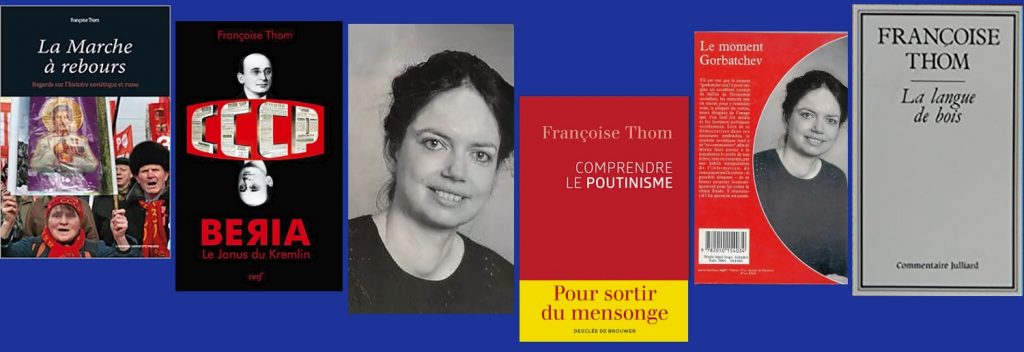
- Pourquoi le système poutinien porte la guerre comme la nuée porte l’orage in DeskRussie (2022-06-17)
- Why the Putin System Carries war Like a Cloud Carries a Storm in DeskRussia (2022-06-17)
- La rhétorique de l’agresseur in DeskRussie (2022-06-03) Françoise Thom
- The Rhetoric of the Aggressor in DeskRussia (2022-06-03)
- L’autre offensive russe in DeskRussie (2022-05-20)
- The Other Russian Offensive in DeskRussia (2022-05-20)
- L’orthodoxie spéciale du pape François in DeskRussie (2022-05-20)
- The special orthodoxy of Pope Francis in DeskRussia (2022-05-20)
- L’ivresse de la transgression in DeskRussie (2022-05-06)
- Reveling in Transgression in DeskRussia (2022-05-06)
- Réflexions mélancoliques sur l’élection française in DeskRussie (2022-04-22)
- Melancholic reflections on the French elections in DeskRussia (2022-04-20)
- Les idéologues russes visent à liquider la nation ukrainienne in DeskRussie (2022-04-06)
- Russian Ideologues Aim to Liquidate the Ukrainian Nation in DeskRussia (2022-08)
- Pourparlers d’Istanbul : que veut la Russie ? in DeskRussie (2022-04-01)
- Istanbul Talks: What Does Russia Want? in DeskRussia (2022-04-02)
- Les leçons d’une fin de règne : Staline 1952-3, Poutine 2022 in DeskRussie (2022-03-25)
- The lessons of an end of reign: Stalin 1952-3, Putin 2022 in DeskRussia (2022-03-25)
- Poutine, ou l’histoire alternative contre l’histoire tout court in DeskRussie (2022-03-18)
- Alternative History Against History: the Case of Vladimir Putin in DeskRussia (2022-03-18)
- Le monde de l’après-guerre vu de Russie in DeskRussie (2022-03-11)
- The Post-war World Seen from Russia in DeskRussia (2022-03-12)
- Poutine ou la passion de la malfaisance in DeskRussie (2022-03-04)
- Putin or the Passion for Evil in DeskRussia (2022-03-02)
- La kremlinophilie française : un mal incurable ? in DeskRussie (2022-02-25)
- French Kremlinophilia: an Incurable Disease? in DeskRussia (2022-02-26)
- Le dressage de l’Europe : comment le Kremlin exploite la crise ukrainienne in DeskRussie (2022-02-11)
- How to Train Europe: the Kremlin’s Exploitation of the Ukrainian Crisis in DeskRussia(2022-02-11)
- Poutine : le flirt avec l’apocalypse in DeskRussie (2022-01-28)
- Putin: Flirting With Armageddon in DeskRussia (2022-01-28)











